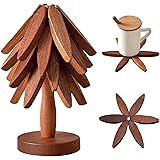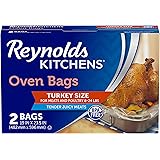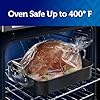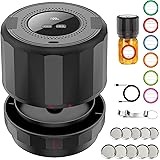Natural Foldable Black Walnut Wooden Trivet Set - 4 Trivets + 1 Stand for Hot Dishes, Pot, Bowl, Teapot, Hot Pot Holders(Black Walnut)
$28.99 (as of November 12, 2025 10:25 GMT -05:00 - More infoProduct prices and availability are accurate as of the date/time indicated and are subject to change. Any price and availability information displayed on [relevant Amazon Site(s), as applicable] at the time of purchase will apply to the purchase of this product.)Reynolds Kitchens Turkey Size Oven Bags, Holds Up to 24 Pounds, 2 Count
$2.66 ($1.33 / count) (as of November 12, 2025 10:21 GMT -05:00 - More infoProduct prices and availability are accurate as of the date/time indicated and are subject to change. Any price and availability information displayed on [relevant Amazon Site(s), as applicable] at the time of purchase will apply to the purchase of this product.)M11 Electric Mason Jar Vacuum Sealer Kit - with Wide and Regular Mouth Mason Lids, Jar Vacuum Sealer for Canning Jars, Vacuum Sealing Machine for Food Storage Black
$28.99 (as of November 12, 2025 10:21 GMT -05:00 - More infoProduct prices and availability are accurate as of the date/time indicated and are subject to change. Any price and availability information displayed on [relevant Amazon Site(s), as applicable] at the time of purchase will apply to the purchase of this product.)- 1. Act Quickly Before the Burnt Residue Sets
- 2. Use Baking Soda and Vinegar for Natural Cleaning
- 3. Employ Commercial Cleaners for Tough Stains
- 4. Try the Boiling Method for Easy Removal
- 5. Use Aluminum Foil as a Scrubbing Tool
- 6. Prevent Future Burnt Residue with Proper Cooking Techniques
- 7. Maintain Your Cookware for Long-lasting Results
1. Act Quickly Before the Burnt Residue Sets
Why Immediate Action Matters
When you notice food burning onto your cookware, the sooner you address it, the easier it will be to clean. Over time, burnt food becomes more ingrained, making it tougher to remove. By acting quickly, you can prevent the residue from hardening and sticking more permanently. In 2025, smart cooking devices can even alert you when temperatures get too high, aiding in fast response.
For example, if your sauce spills and starts to burn, turn off the heat promptly and soak the pot while it’s still warm. Warm water softens burnt-on food more effectively and reduces the need for harsh scrubbing.
Remember, patience is key, but prompt action is your best defense. Properly managing burnt cookware starts with timely intervention, saving you effort and preserving your cookware’s lifespan.
2. Use Baking Soda and Vinegar for Natural Cleaning
Combining Power for Grease and Burnt Food
Baking soda and vinegar are household staples that offer a safe, eco-friendly way to clean burnt cookware. Their chemical reaction helps lift stubborn stains without damaging your pots and pans. In 2025, these natural methods remain popular, supported by research highlighting their effectiveness and safety.
To use this approach, sprinkle a generous layer of baking soda over the burnt areas, then pour vinegar over it. Let the mixture fizz and sit for 15-30 minutes. Afterwards, scrub gently with a non-abrasive scrubber to lift the residue.
This method is especially effective for stainless steel and non-stick cookware. Plus, it doesn’t contain harsh chemicals, making it ideal for households with children or pets.
3. Employ Commercial Cleaners for Tough Stains
Choosing the Right Commercial Products
Sometimes, natural remedies just arenât enough, especially with heavily burnt or charred residue. In 2025, advanced cleaning products specifically formulated for cookware are available, offering powerful solutions while being safe for various materials.
If you opt for commercial cleaners, always follow the manufacturerâs instructions carefully. Popular choices include chemical-based oven cleaners or specialized cookware degreasers. Ensure adequate ventilation when using these products, as some contain strong fumes.
Using commercial cleaners smartly can save you significant effort, but remember, they should be your last resort after trying gentler methods.
4. Try the Boiling Method for Easy Removal
Steps to Boil Out Burnt Residue
Boiling water with cleaning agents is an effective and chemical-free way to loosen burnt food stuck on the cookware. Fill your burnt pan with water, add a few drops of dish soap or baking soda, and bring it to a boil. Once boiling, turn off the heat and let it sit for 10-15 minutes.
The hot water helps to soften the burnt material, making it easier to scrape off afterward. Use a non-metallic scrubber or spatula to avoid scratching sensitive surfaces.
Regularly using this method can make future cleaning sessions quicker and easier, especially when combined with other tips for how to clean burnt cookware properly.
5. Use Aluminum Foil as a Scrubbing Tool
DIY Abrasive Scrubber
Aluminum foil balls are surprisingly effective at scrubbing away burnt food without scratching your cookware. Crumple a piece into a ball and use it as a scrubber in circular motions over the burnt areas.
This method is particularly useful for cast iron and stainless steel pans. Itâs a budget-friendly alternative to metal scrapers and is safe to use for most cookware surfaces.
To enhance the cleaning power, combine the foil with baking soda or a commercial cleaner. Remember, always test on a small area first to prevent accidental damage.
6. Prevent Future Burnt Residue with Proper Cooking Techniques
Best Practices for Safe Cooking
Prevention is the best way to avoid the hassle of cleaning burnt cookware properly. Adjust your cooking techniques by using moderate heat, stirring frequently, and ensuring enough liquid in sauces to prevent burning.
Investing in quality cookware with heat distribution features helps maintain consistent temperatures, reducing the risk of burning food. In 2025, smart stoves with temperature controls provide an extra layer of safety and efficiency.
Cleaning burnt cookware properly begins with preventing the burn in the first place, saving you time and preserving your cookware’s integrity over years of use.
7. Maintain Your Cookware for Long-lasting Results
Proper Maintenance Routines
Regular maintenance helps keep your cookware in pristine condition, making it easier to clean if accidents happen. For example, seasoning cast iron pans and avoiding abrasive scrubbing extends their lifespan.
In 2025, high-tech cookware with non-stick or ceramic coatings may require specific cleaning routines to prevent damage. Use soft sponges and non-abrasive cleaners to preserve any protective coatings.
Consistent maintenance combined with proper cleaning techniques ensures your cookware remains in top shape, reducing the chances of severe burns that are hard to clean.
Conclusion
Knowing how to clean burnt cookware properly is essential for every home chef. With these 7 effective tips for 2025, you can tackle even the most stubborn residues efficiently and safely. Remember, quick action, natural remedies, advanced cleaning products, and preventive techniques all play a vital role in maintaining your cookwareâs longevity. Properly caring for your pots and pans not only improves their appearance but also ensures they serve you well for years to come. By applying the strategies outlined here, you’ll master the art of cleaning burnt cookware properly while enjoying a cleaner, safer kitchen environment.
Frequently Asked Questions
1. What is the best way on how to clean burnt cookware properly?
The most effective method depends on the material, but generally, combining baking soda, vinegar, and boiling techniques provides excellent results. For stubborn burns, using commercial cleaners or aluminum foil scrubbing can help.
2. Can I use bleach to clean burnt cookware?
It’s not recommended, as bleach can damage certain cookware surfaces and pose health risks. Stick to natural remedies or specialized cleaners suited for your cookware type.
3. How often should I clean my cookware to prevent burns?
Regular cleaning after each use and promptly addressing spills helps prevent burn residues from setting. Deep cleaning can be scheduled monthly or as needed based on use.
4. Why is it important to know how to clean burnt cookware properly?
Proper cleaning preserves your cookware, makes cooking safer, and prevents buildup that can affect the taste of your food. It also extends the life of your pots and pans, saving money in the long run.

















